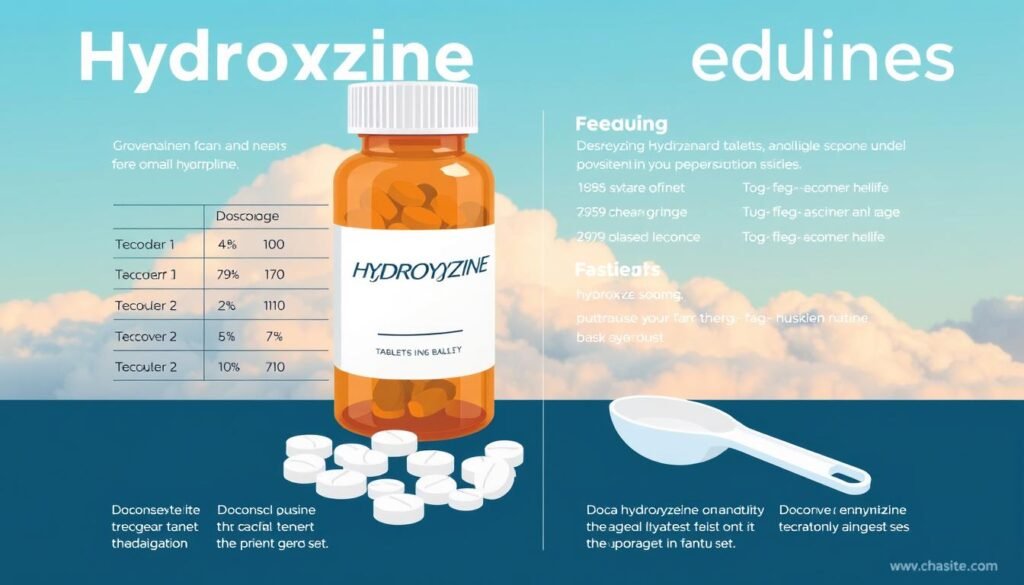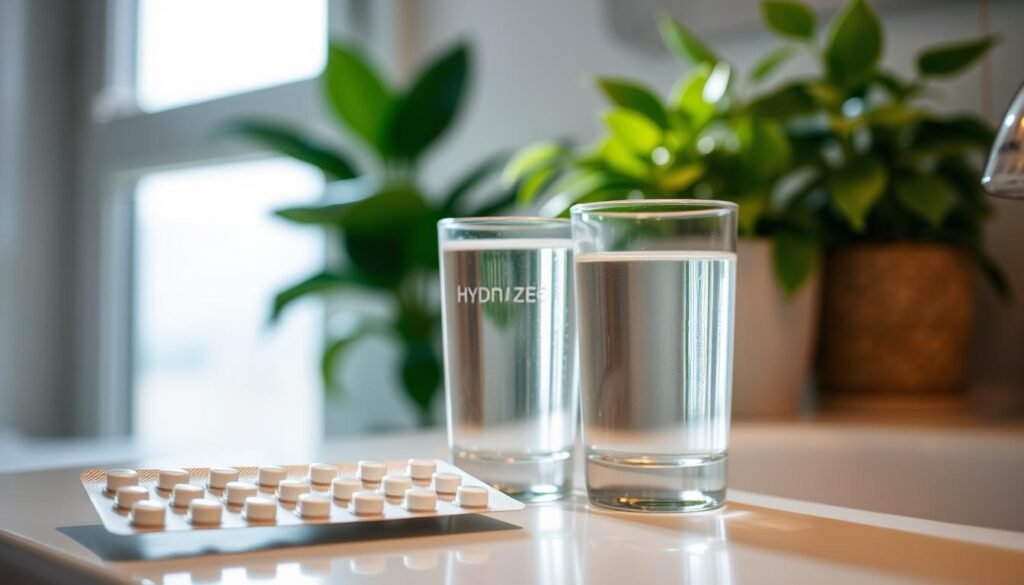About 18.1% of U.S. adults had anxiety disorders last year. Such a high number shows how crucial effective treatments are. Hydroxyzine is one of these treatments. It helps manage anxiety. Knowing the right Hydroxyzine dosage for anxiety is key to feeling better with fewer side effects. We will cover how much Hydroxyzine to take, including starting doses and how it varies by age. You’ll learn how to use Hydroxyzine safely. This information aims to help you handle your anxiety well.
Key Takeaways
- The starting dose of Hydroxyzine for adults with anxiety typically ranges from 25mg to 50mg taken three to four times daily.
- Dosage for children is determined by their healthcare provider based on weight and individual needs.
- Common side effects can include drowsiness, dry mouth, and dizziness.
- Hydroxyzine can also be prescribed for insomnia, with doses generally starting at 50mg.
- Hydroxyzine should be used with caution if taking other sedatives or alcohol.
Introduction to Hydroxyzine
Hydroxyzine is an antihistamine used for anxiety relief, allergies, and sedation before surgery. It quickly helps individuals with anxiety. Knowing about hydroxyzine helps patients grasp its benefits and how it works.
The usual start dose for adults with anxiety is 25mg to 50mg, taken 3 to 4 times daily. This dosage can improve anxiety symptoms within hours. Hydroxyzine’s effects last about 4 to 6 hours, great for short-term management of anxiety.
Hydroxyzine is safer than many drugs since it has a low risk of misuse and addiction. It’s good for people with past substance abuse issues. But, it may cause drowsiness, dry mouth, and dizziness, which usually lessen over time.
Some patients might face challenges like stomach issues or allergic reactions initially. Open communication with doctors is key to handling these symptoms properly.
It’s crucial to understand hydroxyzine’s role in treating anxiety. This knowledge forms the basis for discussing how to use it correctly. Hydroxyzine is important in medicine, helping people find peace and stability in their lives.
What is Hydroxyzine?
Hydroxyzine is an antihistamine known for blocking histamine in allergic reactions. It’s crucial to understand its main uses for health. This drug is approved by the FDA to treat anxiety, allergic skin reactions, and sedation before surgery.
Its action reduces histamine effects, leading to fewer allergies and less anxiety. Hydroxyzine is helpful for short-term anxiety, reducing itching from allergies, and calming patients before surgery. Knowing about hydroxyzine shows its benefits but reminds us of the need for correct dosing and monitoring.
Hydroxyzine Dosage Guidelines for Anxiety
It’s key to know the right hydroxyzine dosage for treating anxiety. Dosage varies based on age and the condition being treated. Adults usually take 50 to 100 mg of hydroxyzine four times a day for anxiety relief. This helps get the best results and keeps side effects low.
Typical Dosages for Anxiety Relief
Adults take 50 to 100 mg, four times a day to ease anxiety. They shouldn’t take more than 400 mg in a day. Kids 6 and older can take 50 to 100 mg daily in different doses. For those under 6, a safer dose is 50 mg daily, also in split doses.
Dosage Variances for Different Age Groups
Dosage needs change with age. Adults usually use hydroxyzine for anxiety. But the dosage for kids 6 and up can differ based on their growth needs. They may take 50 to 100 mg daily for anxiety or allergies. Younger kids need a structured dose of 50 mg daily, split into smaller amounts. Always adjust doses under a doctor’s guidance, especially for pre-surgery anxiety relief.

| Age Group | Typical Dosage for Anxiety | Dosage for Allergic Reactions |
|---|---|---|
| Adults | 50-100 mg, four times a day | 25 mg, three to four times a day |
| Children 6 years and older | 50-100 mg per day, divided doses | 50-100 mg per day |
| Children under 6 years | 50 mg per day, divided doses | 50 mg per day, divided doses |
Always talk to a healthcare pro to get the right hydroxyzine dosage for anxiety. This ensures safe and effective treatment. For more details, check out the comprehensive dosage info.
Forms and Strengths of Hydroxyzine
Hydroxyzine comes in different forms and strengths. This means patients can pick the best type for their therapy needs. Knowing about hydroxyzine forms and hydroxyzine strengths helps make good drug choices. Here’s a list of the available hydroxyzine dosage forms and their strengths.
Available Dosage Forms
- Oral Tablets
- Capsules
- Syrup
- Injectable Form
Strengths of Hydroxyzine
Oral tablets come in these strengths:
| Form | Strength (mg) |
|---|---|
| Oral Tablet | 10 |
| Oral Tablet | 25 |
| Oral Tablet | 50 |
Choosing the right hydroxyzine forms and hydroxyzine strengths is key for successful treatment. Patients should talk to their doctors to pick the best option for their health.
How to Use Hydroxyzine Effectively
For hydroxyzine to work well, it’s key to follow the doctor’s orders closely. Don’t change how much you take without asking a doctor. Make sure to take the medicine regularly as told.
Hydroxyzine can be taken with or without eating. Some people prefer taking it with food to avoid stomach upset. Others find it better on an empty stomach. Knowing the best way to take hydroxyzine helps its effectiveness.
Hydroxyzine starts working fast, often in 30 minutes to two hours. This is helpful for those experiencing sudden anxiety. So, planning when to take your dose is important.
Below are essential tips for the effective use of hydroxyzine:
- Follow the prescribed dosage: Stick to the dose your doctor has recommended for the best results.
- Regular schedule: Taking your medicine at the same times every day helps keep a steady amount in your body.
- Monitor side effects: Be aware of any changes and talk to your doctor if you notice anything.
- Avoid alcohol: Drinking alcohol while on hydroxyzine can increase drowsiness and other side effects.
- Consult your healthcare provider: Check in with your doctor regularly, especially if you think your dose needs adjusting.

Missed Dose and What to Do
If you forget to take your hydroxyzine dose, remember it’s crucial to take it soon as you can. If it’s almost time for your next dose, skip the one you missed. Never take extra doses to catch up; that can cause bad side effects.
Following a set dosing schedule might be hard. But, these hydroxyzine dosing tips can help:
- Set reminders or alarms to help remember when to take each dose.
- Use a pill organizer to track daily doses effectively.
- Keep the medication in a visible place to remember to take it.
- Communicate with healthcare providers about any ongoing issues with missed doses.
Having a routine helps avoid missing doses, leading to better control of anxiety. For more dosing details and what to expect from hydroxyzine, consult trusted information sources.

Hydroxyzine and Related Precautions
It’s vital to understand hydroxyzine precautions for safe use. This drug works well for various conditions but has risks. Knowing about hydroxyzine potential side effects and hydroxyzine drug interactions helps in making smart health choices.
Potential Side Effects
Hydroxyzine can cause dry mouth, dizziness, and confusion, mainly in older adults. Severe effects include trembling, seizures, or allergic reactions like rashes. If you feel dizzy, have headaches, or notice heart rhythm changes, watch your health closely.
Older adults may be more sensitive to confusion and constipation from this drug. Children might get excited instead of sleepy. Stop using it and talk to a doctor right away if you get severe skin issues or overdose symptoms, such as nausea or agitation. For more on side effects, click this link.
Drug Interactions to be Aware Of
Hydroxyzine interacts with many drugs, 583 to be exact, with 92 major ones. These major interactions can increase side effects or lower how well hydroxyzine works. Mixing it with CNS depressants or alcohol can heighten sedation and breathing issues.
Talk to your doctor if you’re taking other medicines, especially ones that change heart rhythm or those that hydroxyzine may affect. It’s not safe to combine hydroxyzine with other antihistamines like cetirizine or levocetirizine. Knowing about hydroxyzine drug interactions leads to safer use.
Optimal Hydroxyzine Dosage for Anxiety Management
Finding the right hydroxyzine dosage for anxiety is key to good treatment. This antihistamine is known to help reduce anxiety symptoms. The right dose varies by age, weight, and health conditions.
Adults with anxiety should take 50 to 100 milligrams (mg) up to four times daily. This helps get the most benefit while lowering side effect risks. For surgery sedation, the dose is the same but given once.
Kids over 6 years old usually get 50 to 100 mg per day, split into doses. Those under 6 years are given 50 mg daily, in divided doses. Tailoring the dose to the individual is crucial for the best results.
It’s important to follow the dosing advice closely. Making the right dose adjustments can improve anxiety control and reduce side effects. Side effects can include drowsiness or even convulsions in rare instances among kids. Sticking to these instructions helps hydroxyzine effectively manage anxiety.
Special Considerations for Different Populations
Prescribing hydroxyzine requires special guidelines for kids and older people. It’s vital to know the needs of these groups for effective and safe treatment. Dosages must be adjusted, and the patient’s age and health issues considered.
Pediatric Considerations
The hydroxyzine pediatric guidelines call for careful prescribing. For kids aged 6 to 12, doctors often start with 50 mg of hydroxyzine three times a day for anxiety. Children aged 2 to 6 usually begin with a total of 50 mg per day, split into smaller doses. This helps with the medicine’s effectiveness and ease of use. Doctors look at weight, health, and other medicines the child is taking. They also monitor how quickly a child processes the medication, adjusting the dose if necessary.
Geriatric Population Guidelines
Older adults need different care as outlined in the hydroxyzine geriatric considerations. Changes in how their body works can affect how well hydroxyzine works and its safety. Starting doses for the elderly range from 25 to 50 mg. Doctors should regularly check how the patient is responding and adjust the dose as needed. Older patients might be more sensitive to medication. Thus, doctors need to watch for side effects closely. A tailored treatment plan ensures that the hydroxyzine dosage for children and elderly is both safe and effective.
| Age Group | Typical Starting Dosage | Dosing Frequency |
|---|---|---|
| Children (6 to 12 years) | 50 mg | 3 times a day |
| Children (2 to 6 years) | 50 mg/day | Divided doses |
| Elderly | 25 to 50 mg | As prescribed |
Conclusion
Hydroxyzine is a choice for those needing help with anxiety. This article covered its dosing, use, various forms, and side effects. Knowing these details helps patients and healthcare providers use it safely and effectively.
It’s not a one-size-fits-all solution, especially before surgery for kids. Yet, dosages can be adjusted. Doses from 10-25 mg help manage anxiety, as the summary of hydroxyzine dosing explains. But it’s crucial to watch for side effects to prevent issues.
Using hydroxyzine for anxiety requires knowing a lot about it. This ensures the best approach for each person. Always talk to a healthcare provider before starting treatment. This ensures the safety and success of the treatment plan.